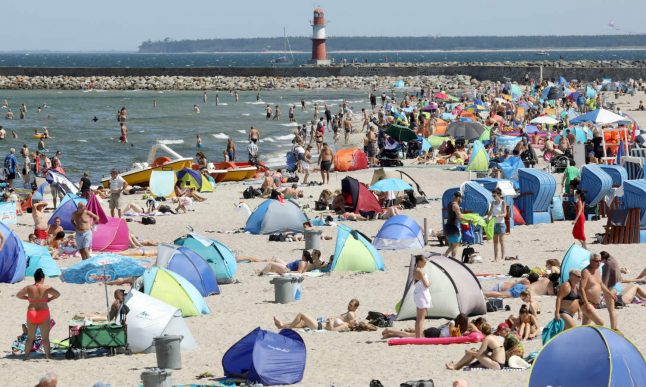The elderly woman was infected by vibrio bacteria after bathing in the Baltic Sea, north east Germany, earlier this summer, local paper the Ostsee-Zeitung reported.
According to the State Office for Health and Social Affairs the victim belonged to an ‘at risk’ group of people who are more vulnerable to the bacteria.
In addition to the death, authorities in the state of Mecklenburg-Western Pomerania say four other people have become infected by the bacteria since June.
“All those affected belonged to the known risk groups,” said Dr Martina Littmann, head of the state health department.
Details about the women who died have not been disclosed due to data protection.
READ ALSO: Vacationer killed by Baltic Sea bacteria
Increased risk due to climate change
Vibrio bacteria are usually found in warm tropical waters, but researchers have found them in the Baltic Sea as a result of rising temperatures due to climate change.
They belong to a group of bacteria which – depending on the strain – can cause gastroenteritis or cholera in humans if raw or undercooked shellfish are consumed, or through exposure to contaminated seawater.
The bacteria, is especially harmful to those with chronic liver disease and compromised immune systems, such as those with HIV or diabetes and the elderly. If the infection takes hold, it can lead to blood poisoning and sepsis
“Vibrio bacteria multiply strongly, especially in waters with a salt content of 0.5 percent and above a temperature of about 20C,” said Littmann.
These conditions exist in the German North Sea area and on the Baltic Sea coasts, especially in warm summers, which appear to becoming more frequent due to climate change.
During last year's hot summer, authorities registered 18 illnesses caused by the bacteria. Of this group three people died.
In 2003, two bathers became infected by the bacteria, and one of them died.
'Holidaymakers are frequently affected'
The investigations into the bacteria began at the end of June along the Baltic Sea coast, and in the coastal Bodden waters.
Samples are taken regularly until the beginning of September. This year 16 samples have been collected so far.
Health officials said it was important to spread the message that there is a risk of contracting the infection at the holiday destination, which is popular with Germans as well as tourists from outside the country.
READ ALSO: Booming and bursting: How is tourism impacting Germany's Baltic Sea coast?
“Since holidaymakers from other federal states are also frequently affected, it is very important to pass on information beyond national borders,” said Littmann.
What are vibrio bacteria?
According to the Centers for Disease Control and Prevention (CDC), vibrio bacteria live in certain coastal waters and are present in higher concentrations between May and October. When the weather gets hotter, like during recent heatwaves, the risk of a higher concentration of the bacteria increases.
How does infection occur?
If open wounds come into contact with infected sea water, vibrio bacteria can infect the wounds. People may also become infected by eating raw or undercooked shellfish, particularly oysters. Elderly and those with compromised immune systems are at particular risk of infection.
What are the symptoms?
When ingested, vibrio bacteria can cause watery diarrhea, often accompanied by abdominal cramping, nausea, vomiting, fever, and chills. According to the CDC, these symptoms usually occur within 24 hours of ingestion and last about three days.
Most people with a mild case of vibriosis recover after about three days with no lasting effects. However, people with a vibrio vulnificus infection can get seriously ill and need intensive care or limb amputation. About one in five people with this type of infection die, sometimes within a day or two of becoming ill. “Severe illness is rare and typically occurs in people with a weakened immune system,” the CDC says.
How can it be prevented?
To reduce your chance of getting vibriosis, experts say you shouldn't eat raw or undercooked shellfish, such as oysters. If you have a wound (including cuts and scrapes), avoid contact with salt water or brackish water (often found where a freshwater river meets the sea). Cover the wound with a waterproof bandage if there’s a possibility it could come into contact with salt water or brackish water, raw seafood, or raw seafood juices.



 Please whitelist us to continue reading.
Please whitelist us to continue reading.
Member comments